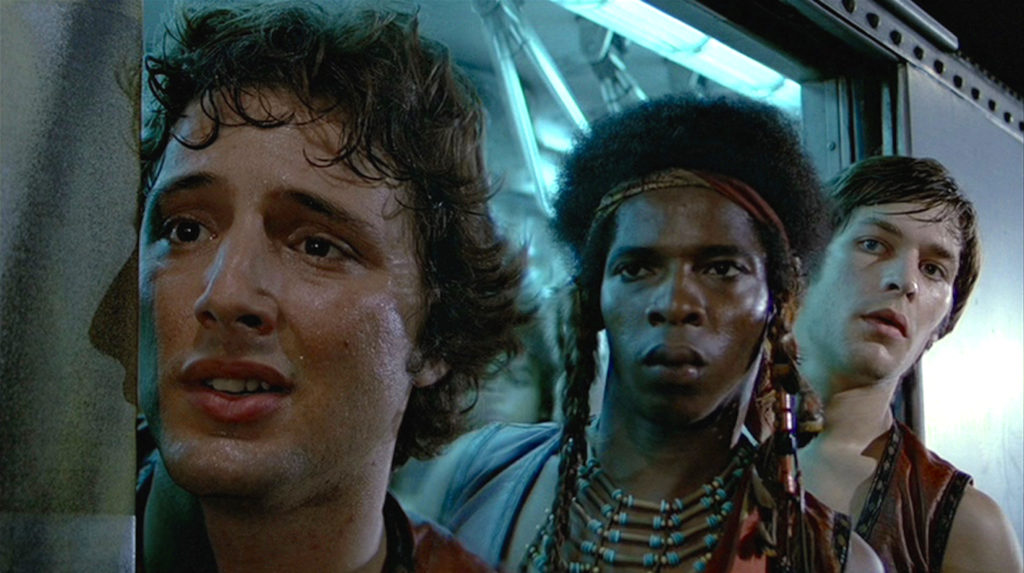Growing up as a kid my stepdad introduced me to a range of films which he had watched as a child growing up in the seventies. As a result, I probably watched some films which I perhaps shouldn’t have at such a young age. There were two films directed by Walter Hill which were favorites in our household, the box office bomb Streets of Fire (1984) and the box office smash which was The Warriors.
Both films would transport me to the seedy, neon-lit, urban American landscapes where guys were macho, but the women were equally as fierce and independent. These two films were highly visual, vibrant pieces of pop art that seemed to embrace pop culture in every form whether it be graphic novels or in fashion. Simply put, Walter Hill understood what was cool and hip with the kids.
“Hill understood what teenagers liked, and as a result, he made a film that they could identify with.”
The Warriors is a film that is so uniquely grounded in the era it was released, but at the same time, it is a timeless classic, with a story that is universal on so many levels. Hill managed to create the ultimate anti-establishment film, which spoke to the youth of the time in a way that wasn’t patronizing or pandering. Hill understood what teenagers liked, and as a result, he made a film that they could identify with, even if they weren’t part of the gangland culture. It may not be the best film of 1979 (it is by no means a masterpiece like Being There, Alien or All That Jazz), but The Warriors is certainly the most entertaining film of 1979.
The plot of The Warriors is fairly simple and that works in its favor. The city’s greatest gang leader called Cyrus (Roger Hill) calls representatives of every prominent gang in the city to a meeting in a Bronx park, seemingly ushering in a new golden era of gang unity. Cyrus informs the crowds that they all outnumber the police three to one, which means that if they unite together they could take over the city.
“The Warriors is the ultimate comic book fantasy film, not to be taken too seriously and just simply be there as a form of entertainment.”
Everyone seems on board with this decision, apart from Luther (David Patrick Kelly), leader of the Rogues, who shoots Cyrus dead. Luther frames the Warriors’ leader Cleon for the murder. Swan (Michael Beck), the Warriors’ “war chief”, takes charge of the group as they try to make it back home across the wild streets of New York from the north end of The Bronx to their home turf in Coney Island in southern Brooklyn. Upon their journey home, they come across Mercy (Deborah Van Valkenburgh) who tags along and becomes a love interest of sorts for Swan.
With The Warriors, Walter Hill creates a highly imaginative world full of its own sets of rules and customs. it’s a hyper-reality, set in a place that looks familiar to us, but at the same time, we know it’s just a fantasy.
The Warriors is the ultimate comic book fantasy film, not to be taken too seriously and just simply be there as a form of entertainment. Even as a child, I could tell that this was just a movie and that the world of gang culture was never that cool or glamorous.
However, the worlds of reality and fantasy can collide with devastating results. The Warriors opened on February 9, 1979, without any major incidents. In fact, it wasn’t until the following weekend the film was linked to sporadic outbreaks of vandalism and three killings — two in Southern California and one in Boston — involving moviegoers on their way to or from showings.
“The film became a major hit, earning well over its modest budget of $4 million.”
This led to Paramount removing advertisements from radio and television completely, and display ads in the press were reduced to the film’s title, rating, and participating theaters. However, as they say, “no publicity is bad publicity” and the film became a major hit, earning well over its modest budget of $4 million.
Upon its release, the film received negative reviews, with Roger Ebert describing the film as a “ballet of stylized male violence”. Linda Gross was less polite with her criticism, describing the film as “an inciteful, stylized and shallow portrayal of gang warfare that panders to angry youthful audiences.”
However, critic Pauline Kael was a fan of the film, in her review for the New Yorker, she stated that “The Warriors is a real moviemaker’s movie: it has in visual terms the kind of impact that ‘Rock Around the Clock’ did behind the titles of Blackboard Jungle. The Warriors are like visual rock.” Kael certainly recognized the impact that this film had on the youth culture of the time, and acknowledged how Walter Hill was homaging the films of the 1950s (another era of teenage rebellion and street gangs).
“Like all great cult classics, it’s full of quotable lines and iconic moments.”
Praise has to be had to the likes of Hill, cinematographer Andrew Laszlo, costume design by Frederic C. Weiler and the score by Barry De Vorzon. With their combined efforts creating a film which stood out from the rest of the films of 1979.
The cast all seem perfect in their roles, with Michael Beck and Deborah Van Valkenburgh being the most memorable alongside David Patrick Kelly’s deranged Luther. The Warriors has now become a cult classic, and like all great cult classics, it’s full of quotable lines and iconic moments.
For me, whenever I hear someone clanging glass bottles together, I instantly think of Luther calling out for the Warriors to come and play. Sure, go out and play once you’ve sat down and caught up with The Warriors, they’re pretty good…re-e-al good…you dig?

